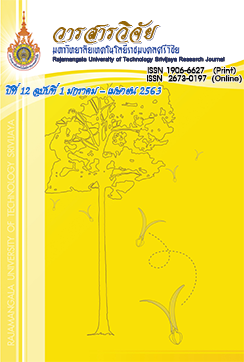Human Resource Development to Enhance Competitiveness of the MICE Industry in Songkhla
Keywords:
MICE, Human resource developmentAbstract
MICE industry is the industry that delivers service and products to customers through the management from human resources who have high potential. Therefore, human resources become the most important part of the MICE industry. Moreover, human resources must be equipped with high skills, potential and experience in management. In addition, the knowledge of psychology should be applied in order to efficiently serve and respond to the customers’ needs. The research aims to study the potential of human resources in MICE industry and present the guidelines for the human resource development to increase the competitive advantages in MICE industry in Songkhla province. This research was conducted by using qualitative methods. The data were collected by in-depth interview from 11 key informants who are administrations of relevant public and private organizations in MICE industry. Research finding presents 4 aspects of competitive human resource desired in MICE industry in Songkhla province: 1) Foreign languages communication skills, 2) Services skills, 3) Information Technology skills, and 4) Event management skills. The suggestion of this study is to support and develop the human resource in MICE industry to be able to communicate professionally, provide excellent service, be creative, and have innovative thinking and administration and marketing skills to increase competitive advantages of MICE industry in Songkhla province.
References
ชมพูนุช จิตติถาวร. 2555. ความรู้เบื้องต้นเกี่ยวกับการจัดประชุม นิทรรศการ และการท่องเที่ยวเพื่อเป็นรางวัล. เอกสารการสอนชุดวิชา การจัดการธุรกิจการจัดประชุม นิทรรศการ และการท่องเที่ยวเพื่อเป็นรางวัล,มหาวิทยาลัยสุโขทัยธรรมาธิราช.
ชนะการณ์ ออสุวรรณ. 2548. ความต้องการของนักท่องเที่ยวต่อการบริหารจัดการอุตสาหกรรมการท่องเที่ยวหัวหิน. วิทยานิพนธ์ปริญญาเทคโนโลยีอุตสาหกรรมมหาบัณฑิต, มหาวิทยาลัยศรีนครินทรวิโรฒ.
ชาย โพธิสิตา. 2550. ศาสตร์และศิลป์แห่งการวิจัยเชิงคุณภาพ. พิมพ์ครั้งที่ 3. อมรินทร์พริ้นติ้ง แอนด์ พับลิชชิ่ง จำกัด (มหาชน), กรุงเทพฯ.
ชุติมา ต่อเจริญ, เอสเธอร์ ใจไหว และ จินดา สวัสดิ์ทวี. 2549. รายงานการวิจัย การพัฒนาทรัพยากรมนุษย์ด้านเทคโนโลยีสารสนเทศเพื่อการท่องเที่ยวเชิงศิลปวัฒนธรรมในจังหวัดกระบี่ พังงา และภูเก็ต. มหาวิทยาลัยสงขลานครินทร์ วิทยาเขตภูเก็ต.
ดุษฎี ช่วยสุข และ ดลฤทัย โกวรรธนะกุล. 2558. การพัฒนาศักยภาพอุตสาหกรรมไมซ์ในจังหวัดขอนแก่นเพื่อรองรับการเป็นไมซ์ซิตี้ของประเทศไทย. วารสารการบริการและการท่องเที่ยวไทย 10(1): 15-29.
ยงยุทธ แฉล้มวงษ์. 2557. แรงงานไทยในบริบทใหม่:การเรียนสายอาชีพเพื่อชาติ.สถาบันวิจัยเพื่อการ พัฒนาประเทศไทย. แหล่งที่มา: http://tdri.or.th/tdri-insight/thailabour-force, 20 ธันวาคม 2560.
วัชราภรณ์ สุรภี และ ฉลองศรี พิมลสมพงศ์. 2555. ความต้องการสมรรถนะของบุคลากรในอุตสาหกรรมการจัดประชุม นิทรรศการ และการท่องเที่ยวเพื่อเป็นรางวัลของประเทศไทย. วิทยานิพนธ์ปริญญาศิลปศาสตรมหาบัณฑิต, มหาวิทยาลัยนเรศวร.
วิโรจน์ ระจิตดำรงค์. 2554. ความพร้อมด้านบุคลากรของศูนย์ประชุมในเขตกรุงเทพ มหานครและปริมณฑลต่อการรองรับงานในอุตสาหกรรมไมซ์ (MICE). วิทยานิพนธ์ปริญญาศิลปศาสตรมหาบัณฑิต, มหาวิทยาลัยนเรศวร.
วิทยาลัยนวัตกรรม มหาวิทยาลัยธรรมศาสตร์. 2555. รายงานการวิจัย โครงการจัดทำแผนพัฒนาบริการท่องเที่ยวเพื่อรองรับการเปิดเสรีบริการท่องเที่ยว. กรมการท่องเที่ยว, กระทรวงการท่องเที่ยวและกีฬา.
สาวิตรี ยอยยิ้ม และ สุชาติ ทวีพรปฐมกุล. 2557. ส่วนประสมทางการตลาดที่มีผลต่อการตัดสินใจเลือกบริษัทธุรกิจนำเที่ยวของกลุ่มนักท่องเที่ยวเพื่อเป็นรางวัล. วารสารวิทยาศาสตร์การกีฬาและสุขภาพ 15(3): 119-133.
แสนดี สีสุทธิโพธิ์. ม.ป.ป. จับตามองนครเซี่ยงไฮ้: ตลาด MICE แห่งใหม่ของเอเชีย. แหล่งที่มา: http://goo.gl/Y97RJC, 26 ธันวาคม 2560.
สำนักงานส่งเสริมการจัดประชุมและนิทรรศการ. 2555. แผนแม่บทอุตสาหกรรมการจัดประชุมและการแสดงสินค้านานาชาติ. เอกสารรายงานการประชุม, สำนักงานส่งเสริมการจัดประชุมและนิทรรศการ (องค์การมหาชน).
Aunruen, R. 2005. Needs Analysis English for Travel Agents in Chiang Mai. Master’s thesis of Bachelor of Arts, Kasetsart University.
Chaiyapantoh, P. 2008. The needs and problems in using English with foreigners of hotel front desk staff in Mueang District, Ubon Ratchathani Province. Available Source:http://tdc.thailis.or.th/tdc/basic.php, July 14, 2017.
Dejkunjorn, S. 2005. Identifying the English language needs of Thai pilots. Master’s thesis. Kasetsart University.
Indian Express Newspapers. 2001. The secret of Japan’s MICE success. Available Source: http://travel.financialexpress.com/200801/edge04.shtml, July 14, 2017.
Sanjay, N. and Aliana, L.M.W. 2007. Macao’s MICE Dreams: Opportunities and Challenges. International Jounal of Event Management Research 3: 47-57.
Sangwichien, T. 2015. Characteristics of New MICE People. Available Source: http://www.mktevent.com/, July 14, 2017.
Rogers, T. 2013. Conferences and convention: A global Industry. Ebook, Italy.
Downloads
Published
How to Cite
Issue
Section
License
The content and information in the article published in Journal of Rajamangala University of Technology Srivijaya It is the opinion and responsibility of the author of the article. The editorial journals do not need to agree. Or share any responsibility.







